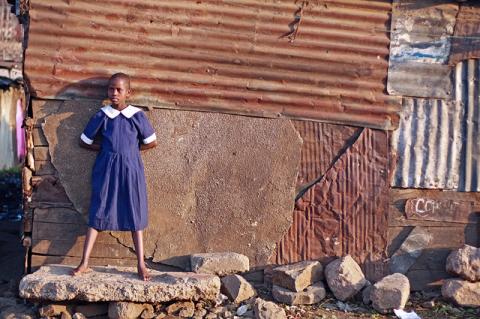
Today’s gospel can leave you thinking that being a disciple of Jesus is an impossibility. Who among us can hate the most cherished people in our lives, our families? But that is not what is meant by this passage. In Luke’s time, hating meant preferring someone to another. And it is very possible to take a preference for God, to give our relationship with God a certain priority over other people and things that vie for our time. And as Luke suggests, taking this preference will inevitably require us to carry a cross.
When I was a Maryknoll lay missioner, I worked as a human rights lawyer in the slums of Nairobi for nearly 10 years. Most of my time was spent representing tenants who were regularly evicted in the middle of the night. The vast majority of tenants lived in tiny one-room tin shacks located on government land without electricity or running water. Tenants who were late in making their rental payments or were occupying valuable land were simply forced out of their homes by the slumlords who had put up the shacks. When I first arrived at the legal aid center and learned about this phenomenon, I wondered how hard could it be to stop this blatantly illegal behavior; in my private practice back in Chicago, it would have been a routine matter to secure a restraining order. But I had no idea what I had gotten myself into or how heavy the cross would become.
I quickly learned it would be nearly impossible to get a court order stopping these landlords – they were armed with private militias and protected by political cronies. Slum rentals were a huge business in Nairobi; for those who dared to file a case, they knew they risked being threatened, arrested, jailed and even killed. I will never forget my first Good Friday in Kenya: One of my clients, Joseph Kimani, was strangled after he filed a case against the local government officials who were trying to demolish the slum where he had lived over 20 years. Not surprisingly, I lay awake many nights worrying if the risk was worth it, whether it was irresponsible or unethical on my part to even file a case that could have such serious consequences.
And yet, day after day, year after year, some of the poorest and most marginalized people I know never hesitated in their effort to challenge the injustices meted out. Although many tenants lost their homes, the vast majority managed to stay in their homes. With the support of their fellow parishioners and an unwavering belief that Mungu yupo (God is present), they stood up for their rights; they filed cases, organized demonstrations and publicized their plight. In the process, they preserved their homes and their dignity and caused me to rethink completely what it meant to be a true disciple. It was the witness of these poor tenants, their ability to endure a suffering which I could not begin to imagine, let alone bear, and their hope for a better life that slowly allowed met to carry my own cross – my limited ability to use the law to help, my powerlessness, my own fears and doubts. Ultimately, it was their discipleship that motivated me to find my own; to take that preference for God.
Photo of Nairobi girl by Meena Kadri
